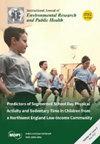A Multi-Mediation Analysis of the Association between Adverse Childhood Experiences and Non-Suicidal Self-Injury among South African Adolescents
3区 综合性期刊
Q1 Medicine
International Journal of Environmental Research and Public Health
Pub Date : 2024-09-17
DOI:10.3390/ijerph21091221
引用次数: 0
Abstract
The available research findings suggest that non-suicidal self-injury (NSSI) constitutes an important public health issue, with identified risk factors for NSSI having been found to include exposure to adverse childhood experiences (ACEs) and comorbidity with various mental disorders. However, the available findings have, for the most part, been based on the experiences of individuals living in predominantly high-income countries located in the Global North, and it is not clear whether these findings can be confidently generalised to individuals living in low-resourced countries. As such, this cross-sectional study assessed risk factors for NSSI in a non-clinical sample of 636 South African adolescents (12–18 years old), with the data being analysed using a multi-mediation analysis. ACEs were assessed using a revised version of the ACEs Questionnaire, and NSSI was assessed using items adapted from the Self-Harm subscale of the Risk-Taking and Self-Harm Inventory for Adolescents, with emotion dysregulation, depression, and PTSD being considered as possible mediators. High prevalence rates for NSSI and exposure to five or more ACEs were reported by the participants, with the mediation analysis indicating that significant direct effects of adverse childhood experiences on NSSI were partially mediated by emotion dysregulation. These findings are discussed with respect to their implications for primary, secondary, and tertiary prevention.对南非青少年童年不良经历与非自杀性自伤之间关系的多重中介分析
现有研究结果表明,非自杀性自残(NSSI)是一个重要的公共卫生问题,已确定的非自杀性自残风险因素包括童年不良经历(ACE)和各种精神障碍的合并症。然而,现有的研究结果大多基于生活在全球北方高收入国家的个人经历,尚不清楚这些研究结果是否能可靠地推广到生活在资源匮乏国家的个人身上。因此,本横断面研究对 636 名南非青少年(12-18 岁)的非临床样本进行了 NSSI 风险因素评估,并采用多重中介分析法对数据进行了分析。ACE采用修订版的ACE问卷进行评估,NSSI采用改编自《青少年冒险与自残量表》自残分量表的项目进行评估,情绪失调、抑郁和创伤后应激障碍被认为是可能的中介因素。据参与者报告,NSSI 和五次或五次以上 ACE 的发生率很高,中介分析表明,情绪失调对 NSSI 有显著的直接影响。这些研究结果对一级、二级和三级预防的意义进行了讨论。
本文章由计算机程序翻译,如有差异,请以英文原文为准。
求助全文
约1分钟内获得全文
求助全文
来源期刊

International Journal of Environmental Research and Public Health
Medicine-Public Health, Environmental and Occupational Health
CiteScore
7.30
自引率
0.00%
发文量
14422
审稿时长
1 months
期刊介绍:
International Journal of Environmental Research and Public Health (IJERPH) (ISSN 1660-4601) is a peer-reviewed scientific journal that publishes original articles, critical reviews, research notes, and short communications in the interdisciplinary area of environmental health sciences and public health. It links several scientific disciplines including biology, biochemistry, biotechnology, cellular and molecular biology, chemistry, computer science, ecology, engineering, epidemiology, genetics, immunology, microbiology, oncology, pathology, pharmacology, and toxicology, in an integrated fashion, to address critical issues related to environmental quality and public health. Therefore, IJERPH focuses on the publication of scientific and technical information on the impacts of natural phenomena and anthropogenic factors on the quality of our environment, the interrelationships between environmental health and the quality of life, as well as the socio-cultural, political, economic, and legal considerations related to environmental stewardship and public health.
The 2018 IJERPH Outstanding Reviewer Award has been launched! This award acknowledge those who have generously dedicated their time to review manuscripts submitted to IJERPH. See full details at http://www.mdpi.com/journal/ijerph/awards.
 求助内容:
求助内容: 应助结果提醒方式:
应助结果提醒方式:


